I’m still in Leon, and we have 25000 evacuated people here. roofs blown off, etc.
I was actually here in my room, preparing the conference of a political party in Norway. The storm was pretty bad, but suddenly the lights went out, and about 10 mins later some of the other living here knocked on the door, advising me to get out an into the kitchen, as a giant Mango-tree looked like it might fall and smash my room.
So I stood in the kitchen for a while (a few hours). The kitchen is halfway outdoors, and so I secured the door leading out with a refrigerator. When the wind started dying down, I walked out and around town. That surely wasn’t very safe, but I needed food. Most trees on the way had fallen, and so had a lot of the electrical installation. In addition, the streets were flooded, and people were running everywhere quite frantically.
Category Archives: Social situations and settings
My time in Rostock
Some have asked for me to tell a bit more about what Rostock really was like. In some of the international media the G8 protests were completely ignored, and in for example the Norwegian media, the stone throwing on Saturday the 2nd were big time news with, as far as I understand, live pictures of riots being beamed to living rooms across the country. Also in Germany, stations such as N-TV showed the same two burned out cars from all angles at various stages of burning, making it look like there had been a whole line of cars that had been whole line of burned out cars. On top of that you had the number of 433 hurt police officers (status Sunday, 3rd). Sounds like civil war, huh?
Well, on the ground it was not quite like that. For anyone reading this only to find action, I can tell you now already that I was never arrested nor hit by a water cannon. I was neither anywhere close to stones being thrown and I did I do anything that in itself, forgetting the special circumstances, would have been very exciting. Well, maybe. If sleeping on a street counts.
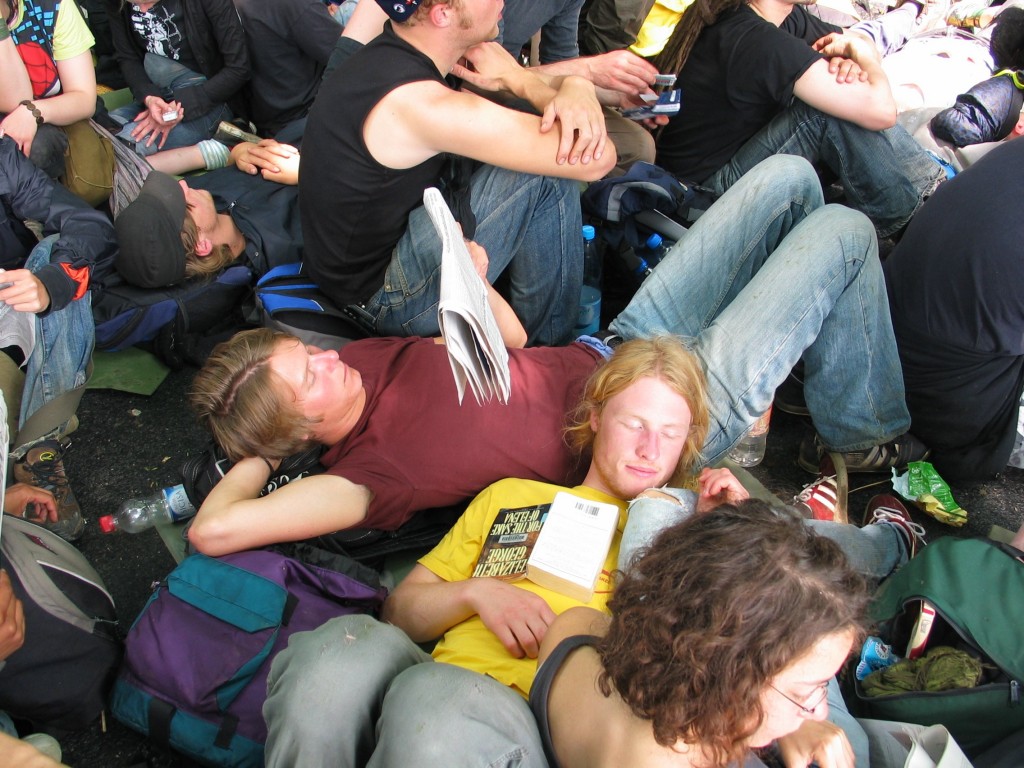
Down in New Cross, London
On my way to Barcelona, Spain, where I am currently trying to acquire the entrance ticket to the cultural imperialist English teaching industry by taking a four week high intensive course in English grammar fascism, I was passing through London and stayed there for a little under a week. Anyone who has been using the low cost airlines to get around Europe that have come about earlier this century will be familiar with being stuck in London, or at least Stansted airport. I was not quite in that situation this time, instead having a bit more time and a few radical meetings and some interviews on my schedule.
And somehow I ended up in a sector of the world working class that I had only known from books previously.
Our site is the New Cross Inn in South Eastern London. When I arrived, at first glance the youngsters there looked like the backpackers who had stayed at the youth hostels in Central America and Mexico. So when I went to the “common room,” being all occupied typing away on my laptop, and some of the others asked me to participate in what i thought was a game, I felt obliged to socialize at least a little with this “party crowd.”
The “game” involved balloons that they blew up with gas and then sucked the air out of them. I thought that the point was that they would fill them with helium and then breath it in to give themselves Mickey Mouse voices. At least in my concept of kids birthdays, that is generally a central part.
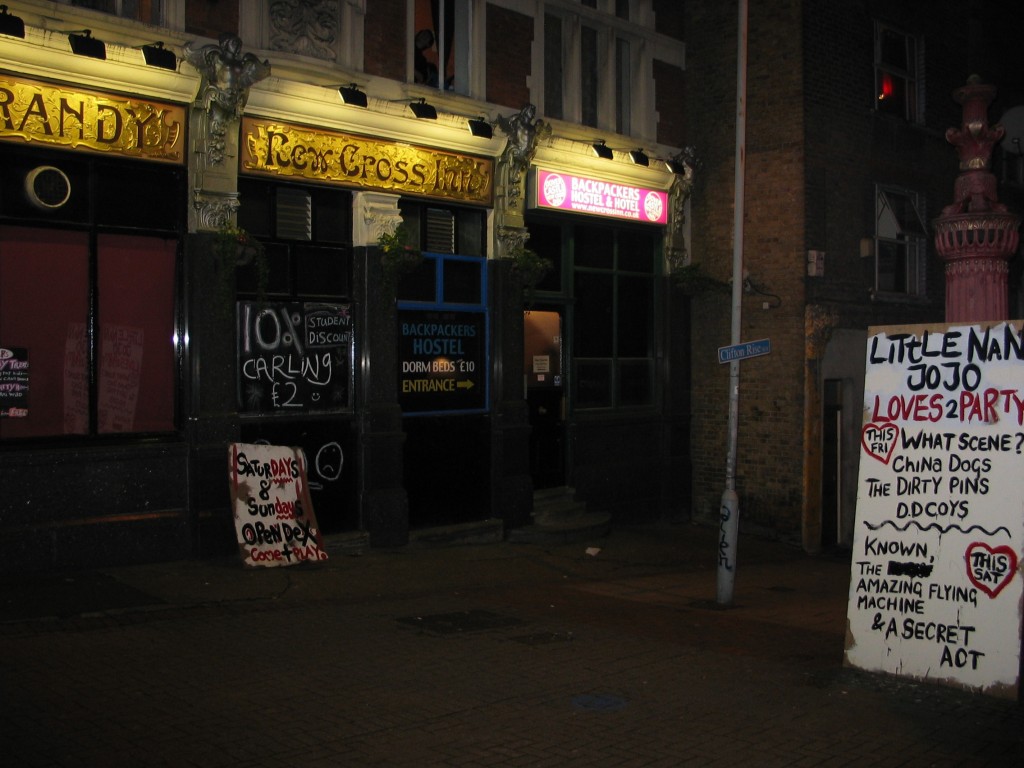
But that was not what was going on. It was not before I was about 3/4 through my balloon that I realized that we were doing drugs. I know, I am really naive about narcotics, and breathing in the gas from a cream whipper is neither forbidden nor all that strong, but I just had no idea.
Ever been graded?
Sure you have! We all get graded all the time. Kindergarden, pre-school, middle school, high school, college, university, various certificates for having learned to swim, ride your bike or drive a car — grading has become one of societies great sports. More than that, especially in societies with a low degree criticism of the structure of society (and here I’m amongst others thinking of the country I currently reside in), it has become an entire ideology of itself: grading is seen as being a scientific activity done according to natural laws and any grade is dependent, and only dependent upon that which is being graded — subjective factors in grading do simply not exist. So if you get some grade from a school in some dinky place in northern Norway, that grade is directly comparable to another student might receive from a school in central Oslo. And more than that: according to this ideology, it is perfectly possible to accumulate grades across subject! So one can somehow say “student A with a certificate from a high school i central Oslo, who got A in math and B in French is a better student than this student B with a certificate from a high school in Tromsø, who got B in English and C in geography”. And people believe that is possible not only for high school, but also for college and university!
And once the grade has been handed out, one can then use it to objectively classify all students and either hand out salaries that correspond to the grades in case they take a job or in order to filter out the best if they choose to go on and take further studies.
Although I have always been highly critical of the first part, up until recently I had believed that at least the second part was one close to that way (although that does of course not make much sense given that the grade is not very objective to begin with).
But then I was called in to a meeting with the Central Admission Committee for bachelor studies of the University of Oslo in which I am one of two student representatives. The meeting was to decide upon the fate of a little more than 100 applicants for “selffinancing bachelor students”…
Continue reading Ever been graded?
Are you a ZIP code spreading communist?
Maybe you wondered why you have not head much about my book lately? Well, the thing is that I felt it was ready, and so did those I talked to here in Norway. As a last check, I send three test copies to key figures in Douglas, and all I got from them was nothing but high approval ratings. So I decided then to go ahead and publish. That was back in February and the book has been spreading since. Then suddenly, on March 21st, I got a mail from another Douglasite “[…] I am about half through it and am finding it entertaining. However, the English grammar and word usage makes it somewhat difficult to understand. I would rate your grammar and word usage as atrocious at best and possibly even horrific. […]”
Ouch, bummer! He then went on to offer me to edit it, and as his rate was incredibly low, I went ahead and agreed for a second edition (which hopefully should be comming up in a few weeks). But do not be worried if you already ordered the book (see right column), according to my other native English speaking contacts, it is absolutely readable and entertaining.
But the reason why I wanted to post on this is due to only a minor aspect of the editing: one thing that the editor pointed out immediately was that I had said that Douglas was on “US territory” — which of course technically is not true. The term “US territory” is usually used to describe those pieces of land which belong to the United States without being part of any particular state (Guam, Washington DC, etc.). My editor pointed out that a “fringe group” had actually given their US citizenship back and traded it in for “state citizenship,” which somehow means that they don’t need to pay (federal) taxes and don’t need to register their car.
I could quite get it, so I researched it a bit more, and what i came up with was “The state Citizens Service Center” and their leader James R. McDonald. They argue as follows:
“CHICAGO WILL BE OURS!”
Tears starting building up in my eyes when I read those words last Thursday. But I quickly wiped them away; I was in public. I had just finished reading Upton Sinclair ‘s The Jungle — a story about a Lithuanian family that immigrates to the United States and lives in the meat packing district of Chicago where they try to get along under the brutal reign of Capitalism. At some point earlier in the book, the entire family decide to unionize, but it does not last long as they start loosing their jobs and generally life is too uncertain for them to old on to the union for very long. Just about all family members end up either dying due to serious accidents that would have been completely preventable if they had had money, or going into prostitution, or both. The only one who survives through it all, after going through periods of hoboing, working under various brutal conditions, and acting as a strike breaker, is the family father Jurgis. And it is only in the end that he discovers the socialist cause and starts to organize with the socialists.
The socialists are the most driven people around, and they are all described in terms like the Swede Nicholas Schliemann:
About the first of July he would leave Chicago for his vacation, on foot; and when he struck the harvest-fields he would set to work for two dollars and a half a day, and come home when he had another year’s supply — a hundred and twenty-five dollars That was the nearest approach to independence a man could make “under capitalism,” he explained; he would never marry, for no sane man would allow himself to fall in love until after the revolution. (p.396-397)
Continue reading “CHICAGO WILL BE OURS!”
Instant groups and lasting connections at New Years
I just got back to Norway today. And that was not entirely my plan in the beginning. I had really planned to be back here some time between Christmas and New Years, but a snow storm all across southern Scandinavia, and in particular in Sweden, made it suddenly more complicated to take the bus, and so I decided instead to spend New Years with some of my friends from high school in Berlin and then to fly back here today.

Now my high school friend are one of the lasting communities (I won’t go into the definition of community here) of mine but in any way I am always amazed of how they have managed to keep the close connections we all have had in school all throughout our time at university; I myself only see them every six months at the max.
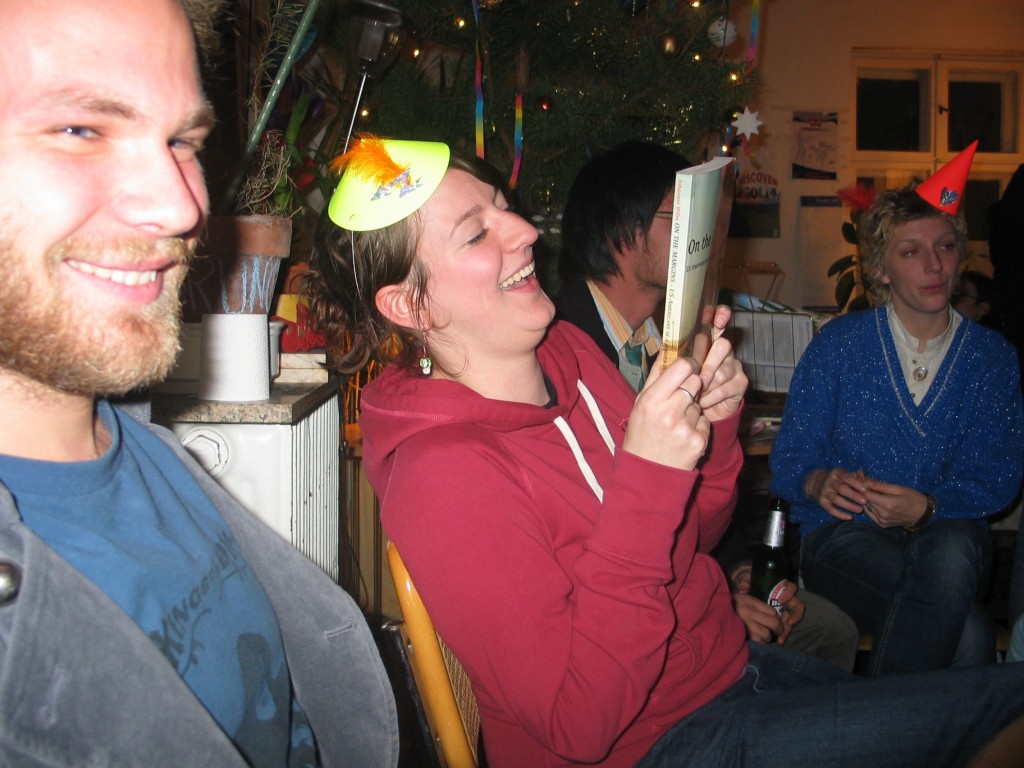
But on my way down to Berlin, I met a group that I would say formed an “instant group.” Now I love to make these things to form, and usually they are over just as quickly as they came into existence. The thing is that in Germany the railway has made a rather cheap group ticket for up to 5 people available for approximately the last decade. It’s called Wochenendticket (Eng: Weekend ticket) and although it hads changed quite a bit from the way it was intially set up, it still gives you the right to travel as far as you want to, as long as you only use short-distance trains. Now you can always still make it from any corner of Germany to another, but it just takes a long time, and you have to switch often.
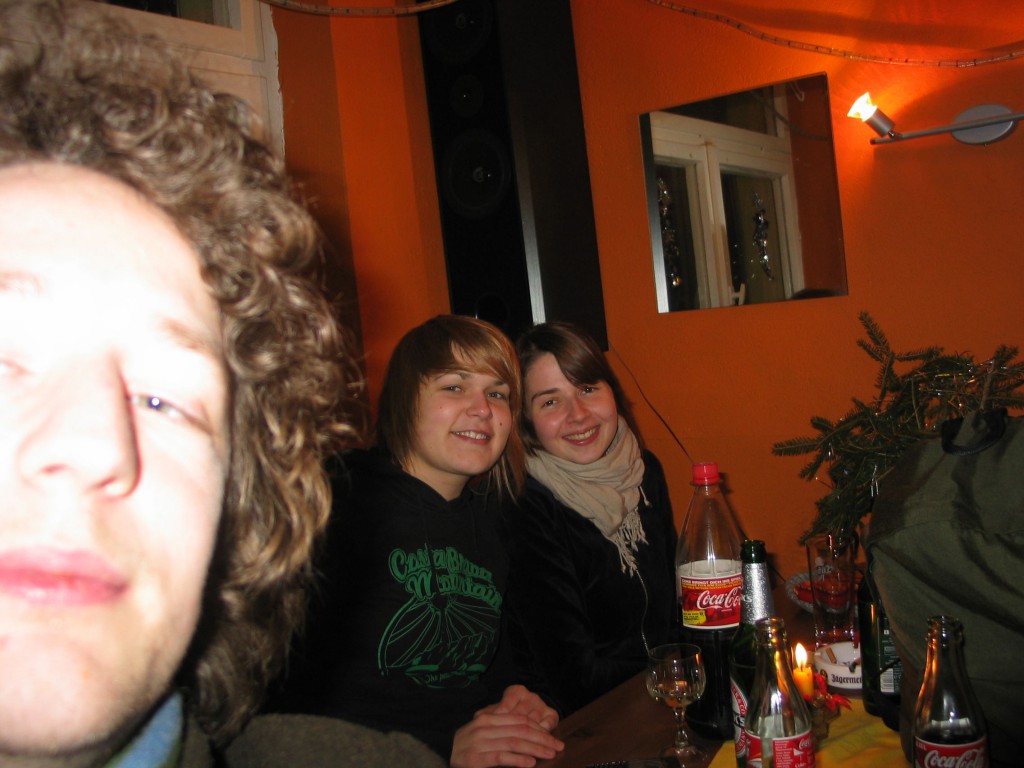
As this ticket has gained popularity especially amongst the youth, certain tiny train stations have become interconnection points for popular travel routes – one of them being the tiny village of “Bad Kleinen” (otherwise only known for a shooting episode between the police and a member of the Rote Armee Fraktion about 15 years ago) on the route between Berlin and the states of Hamburg and Schleswig-Holstein. According to the train schedule, one should be able to switch traisn immediately, but if there are any delays on the train going there, you have to wait two entire hours there! Amongst my friends that are studying in Berlin this has become a known issue and a running joke amongst them is that “Oh no, X is not here yet, she/he is waiting for an alternative train in Bad Kleinen.”
Now this time it was my turn to experience that to happen. I started travelling from Schleswig at 12:33 and expected to be in Berlin at 18:44 – after changing trains four times.
And that is how I celebrated New Years the first time that day with my new found “instant community”…
Continue reading Instant groups and lasting connections at New Years
High school reunion
On December 26th, I attended this high school reunion. It’s not quite the same experience that others have – cause we from the Danish minority’s high school have it every year. Nevertheless, it was a lot of fun. I personally have attended it every single year for the past five years, and every year, we’re a bunch that have been monitoring for dacaying factors to start set in. Didn’t happen. Not this year either – although there was one girl who tried to convince me that she had wrinkles – when she laughs.
Other than that, there was a notciable lack of “Super Danes” – that is people that have turned so Danish – either already in school or later on – and that try to hide away the fact that they have any knowledge of Germany and German. I really have a hard time taking those people.
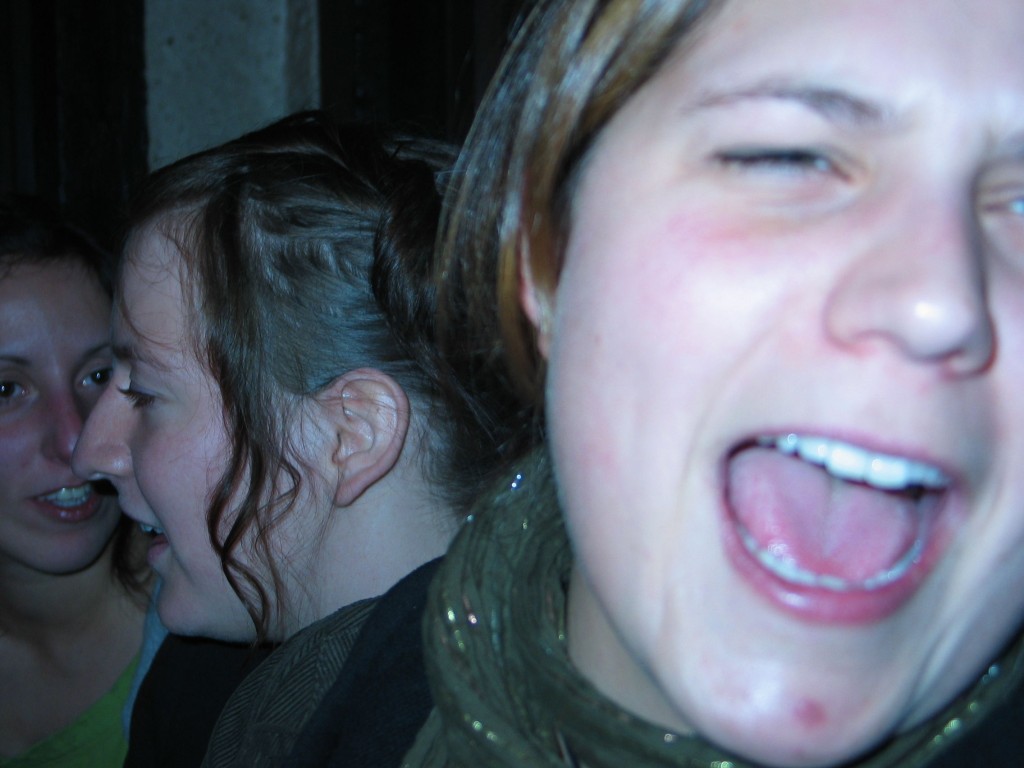
On the other hand there are also those that think they somehow are fundamentally german. Like one guy who knows me well and thought I had switched to Norwegian citizenship already asked: “so do you then have to give up your German one?” J: “I’d think so. So I’m wondering: do you get anything out of ayour German citizenship?” He: “Nooooo…. well, except your identity.” And then we both laughed. See, I don’t agree with that perspective either – but I find it much easier to hang around people with those kinds of views than the Super Danes.
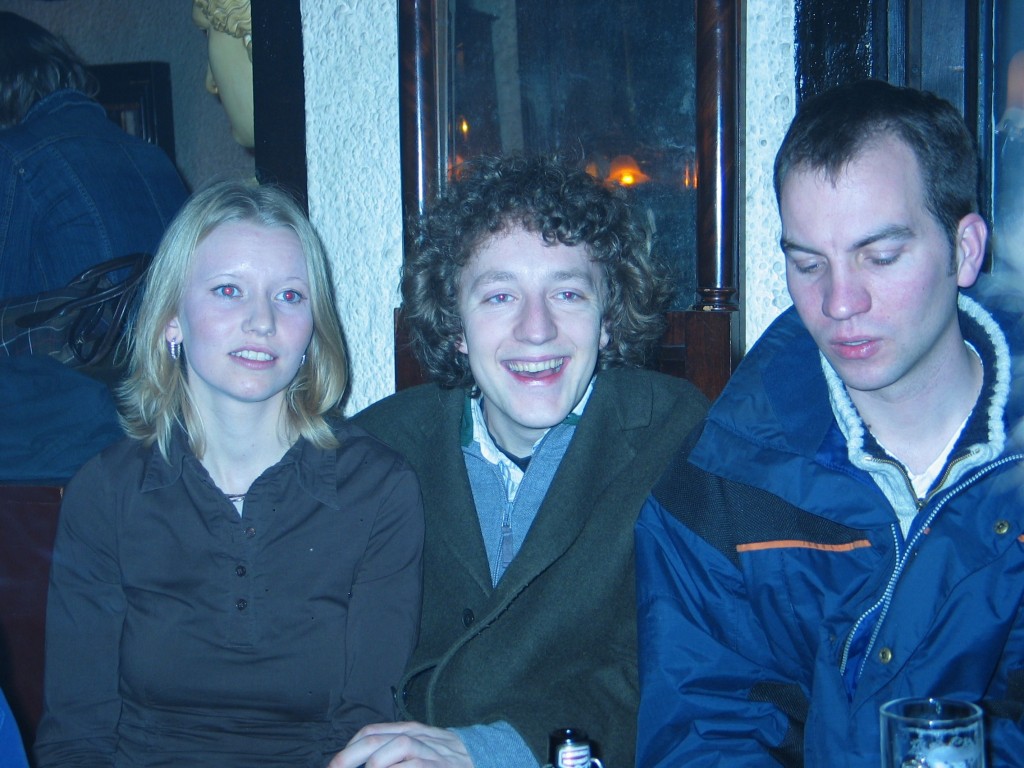
fixing a bike in the dark
OK OK, so I was lying. I didn’t fix it in the dark. First of all, I took the wheel inside once I had removed it from the rest of the bike, and secondly, it’s still not fixed!
Well, it all started with me visiting a friend a few days back, who was so kind to give me his old mobile. See, I had not planned for another mobile and budgeting is a rather tight matter these days.
On my way back to the inner city, one of my bicycle tires went flat – luckily not before I was within crawling distance of my student house. However, also time is budgetted tightly right now, so I had to leave the bike there – locked, but unusable, and instead walk to the university every day. Now you might think that the 30/40 minutes walk each direction easily should match the amount of time spend on fixing the tire – but what you’re forgetting is that every day was planned from morning to evening, and there was no hole of a few hours that I could spend buying another tube, replacing the old one, and getting air from somewhere.
Continue reading fixing a bike in the dark
Free Movies!
It started snowing here in Oslo about 2 days ago. So forgive me for some of my more sentimental comments lately, but I have been sitting in the dark looking at the snow on the trees outside my windows the last few night – and since yesterday with a few candles spread about in my room. I really like both the weather and the candles and the whole atmosphere with Kahimi Karie’s “Photosong”, Serge Gainsbourg’s “Ballade De Melody Nelson” or Margo Guryan’s “Sunday Morning” playing in the background – the first and the last of which I only heard quite recently. (Today some of the snow melted again, so I won’t be able to make pictures right now, but it’ll probably be back and I promise pictures for then.)
But it also makes me sentimental, and crying is really popular with me these days. And I staretd watching some movies (most of which you can download yourself!)
